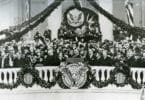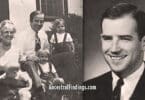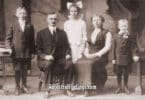William Jefferson Clinton, the 42nd President of the United States, led the nation through economic prosperity and significant global changes. His charisma, policy initiatives, and personal challenges have made him one of the most studied figures in modern political history. Beyond his presidency, Clinton’s story is deeply rooted in his family history and the small-town upbringing that shaped his worldview.
Family Roots: A Story of Resilience
Bill Clinton was born William Jefferson Blythe III on August 19, 1946, in Hope, Arkansas. His biological father, William Jefferson Blythe Jr., was a traveling salesman of English and Scots-Irish descent. Tragically, Blythe died in a car accident three months before Clinton’s birth. This loss profoundly influenced Clinton’s upbringing, as he was raised with stories of his father’s ambition and charm, qualities that Clinton himself would come to embody.
Clinton’s mother, Virginia Dell Cassidy, was a strong and independent woman who played a pivotal role in his life. Born in Bodcaw, Arkansas, Virginia was of Irish and English ancestry. After Blythe’s death, she moved to New Orleans to study nursing, leaving young Bill in the care of his grandparents, Eldridge and Edith Cassidy. The Cassidys provided a stable and loving home, instilling in him the values of hard work, education, and compassion.
Virginia later married Roger Clinton, a Hot Springs, Arkansas car dealer. Bill adopted Roger’s surname as a teenager, formally becoming Bill Clinton. While Roger’s struggles with alcoholism created challenges in the household, Bill maintained a close bond with his mother, who remained a source of encouragement and strength throughout his life.
Early Life and Education: From Hope to Rhodes Scholar
Growing up in Hot Springs, Clinton was an excellent student with a passion for learning and a natural talent for leadership. He attended Hot Springs High School, was active in student government and music, and played the saxophone—a skill that would later become part of his public persona.
A defining moment in his youth occurred in 1963 when he met President John F. Kennedy at the White House as part of Boys Nation, a government education program. The encounter inspired Clinton to pursue a career in public service, setting him on a path to the presidency.
Clinton attended Georgetown University in Washington, D.C., where he studied international affairs and immersed himself in politics. He won a Rhodes Scholarship to the University of Oxford, where he studied philosophy, politics, and economics. Although his time at Oxford was marked by political activism, Clinton also began forming the worldview that would guide his presidency.
Marriage and Family Life: The Clintons’ Partnership
In 1975, Bill Clinton married Hillary Rodham, whom he had met at Yale Law School. Hillary, a brilliant lawyer and advocate, became a steadfast partner in his personal life and political career. While tested by public and private challenges, their marriage remains one of the most prominent partnerships in American politics.
The Clintons have one child, Chelsea Victoria Clinton, who was born in 1980. Chelsea grew up in the public eye during her father’s presidency but has maintained a private and professional life as an advocate and author. Bill and Hillary have often credited Chelsea with bringing balance and grounding to their lives, even amid political turmoil.
Political Career: From Arkansas to the Presidency
Clinton began his political career in Arkansas, serving as the state’s attorney general from 1977 to 1979 and later as governor. At 32, he became one of the youngest governors in U.S. history. His governorship was marked by a focus on education reform and economic development, which laid the groundwork for his national ambitions.
In 1992, Clinton won the Democratic nomination for president, campaigning as a centrist who could appeal to a broad coalition of voters. His campaign emphasized economic revitalization, healthcare reform, and education. Clinton defeated incumbent George H. W. Bush and third-party candidate Ross Perot to become the 42nd President of the United States.
The Clinton Presidency: A Time of Prosperity and Challenge
Clinton’s presidency (1993–2001) is often associated with economic growth and global engagement. Under his leadership, the U.S. experienced its longest peacetime economic expansion, balanced budgets, and budget surpluses achieved through tax increases, spending cuts, and a booming economy.
Clinton championed significant policy initiatives, including the Family and Medical Leave Act, welfare reform, and efforts to expand healthcare access. Internationally, he was pivotal in the Middle East peace process and led interventions in Kosovo and Bosnia to address humanitarian crises.
However, his presidency was not without controversy. The Monica Lewinsky scandal and subsequent impeachment trial overshadowed much of his second term. While the Senate acquitted him, the episode remains a defining aspect of his legacy.
A Personal Side: Clinton’s Love of Music and Storytelling
Bill Clinton has been a lifelong fan of music, particularly jazz. His saxophone performances, including a memorable appearance on The Arsenio Hall Show during the 1992 campaign, endeared him to the public and showcased his charisma.
Clinton is also known for his storytelling ability, often weaving personal anecdotes into his speeches to connect with audiences. His talent for communication earned him the nickname “The Comeback Kid,” reflecting his ability to rebound from challenges and inspire confidence.
Post-Presidency: A Legacy of Global Philanthropy
Since leaving office, Clinton has focused on global issues through the Clinton Foundation, which addresses health, education, and climate change. He has collaborated with world leaders, including former President George H. W. Bush, on disaster relief efforts, highlighting his commitment to bipartisan cooperation.
Clinton remains active in public life, supporting Democratic candidates and causes. His memoir, My Life, published in 2004, provides an in-depth look at his journey and presidency, cementing his place as one of the most compelling figures in modern history.
Final Thoughts
Bill Clinton’s life is a testament to resilience and ambition, from his humble beginnings in Hope, Arkansas, to the highest office in the land. His family history, marked by tragedy and perseverance, shaped the man who would become one of the most influential leaders of his generation. While his presidency is remembered for its economic successes and global initiatives, it is also a story of personal challenges and redemption. Clinton’s legacy continues to evolve, reflecting a life dedicated to service, leadership, and connection.






